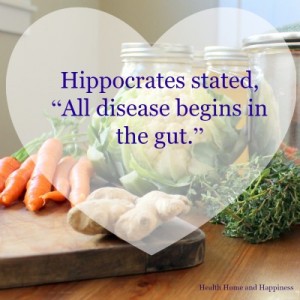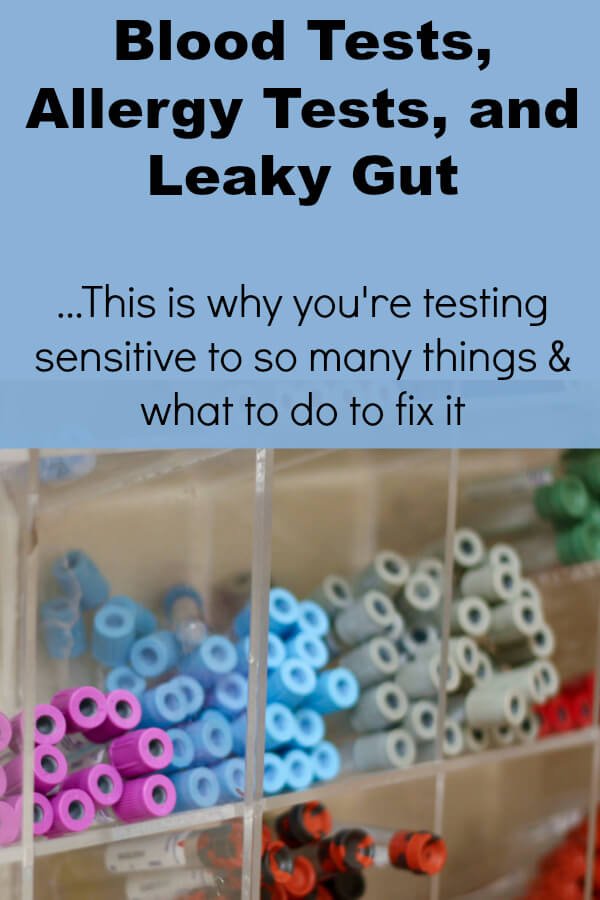
You come with lists a paragraph long of seemingly-random food sensitivities on a print out from a naturopath’s office. You are overwhelmed with not only eliminating these from your diet, but also trying to heal your gut in the process: Cauliflower, egg whites, potato starch, salmon, pork, rice, corn, nuts, soy, dairy, yeast…
Some things on the list you may have suspected already, as you feel better when you eliminate things like soy, wheat, and nuts from your diet.
The others on the long list are usually something that is just showing up on on the test because your gut is leaky.
How does leaky gut influence lab results?
As Dr. Natasha Campbell-McBride explains in the GAPS Book, the problem is the leaky gut. If the gut is leaky, undigested particles of food get through the gut walls, and are irritants in the body as they are not supposed to be there. She says it is not uncommon for a GAPS patient to test allergic to just about everything they are eating.
How do allergy/sensitivity tests work?
IgE allergies can be diagnosed via blood or skin-prick tests in a doctor’s office. IgE allergy tests test for antibodies that are made upon exposure to certain foods. IgE allergies are more serious reactions that typically affect the skin (hives), nose, throat, and lungs.
The medical literature encourages followup with a medically-supervised oral administration of the potential allergen due to the unreliable nature of these tests. (source)
Sensitivity test, or IgG tests are done both with the Enzyme-Linked-Immnosorbent Assay (ELISA) and Antigen Leukocyte Antibody Test (ALCAT) both produce many false positives, leading to unnecessary restriction. (source) (source)
Even though false positives are common, it doesn’t mean that you can completely ignore the idea of food allergies- it is recommended that you do an elimination diet of common allergens instead. (see below)
Why I don’t recommend sensitivity tests
When my daughter was showing signs of autism as a toddler, I knew that taking dairy and gluten out of her diet might help. So I did that, and we saw improvement. Later we started the GAPS diet, and she showed even more improvement. However, after about a year on GAPS I felt like she was stalling in her healing, so I took her to a naturopath to see if they had any suggestions.
After expensive diagnostic tests, the naturopath announced that there was no reason for me to have her on such a restricted diet, and she for sure could eat brown rice and other grains, but maybe I should cut back on the meat.
I knew for a fact that any starch, rice, or grain ingestion sent Hannah into the waking up every 2 hours at night/losing eye contact regression. She also was prescribed an antibiotic for yeast (Nystatin) which we tried for a month and didn’t see any change with.
I glared at anyone who looked at me as I wrote a check for more than our monthly grocery bill at the time, and was completely let down. At that time in our lives we really didn’t have money to waste on things like that, and I really wished I had researched the lab tests before allowing them.
This interaction was a costly experience that confirmed that my little homemade elimination diet/symptom-tracking chart was exactly what this child needed.
Click here to get my symptom chart via email for free
Why elimination diets are better
Your body will heal itself. If you can go down to the least likely foods to cause a problem, and then slowly add in potential allergens, you will give your body the time and space it needs to repair its own gut lining, and start digesting our food better.
Elimination diets are time consuming- it would be easier to just have a printout of a list of foods to avoid, but that printout just isn’t effective. Missing one thing (such as brown rice!) can keep your gut in an inflammatory state and prevent healing.
For an example of a strict elimination diet, check out the Gut and Psychology Syndrome Introduction Diet.
A less intense elimination diet would strictly eliminate common food allergens, or allergens that your family has a sensitivity to for a week, and then attempting a re-introduction. After reintroduction, see if symptoms exacerbate or come back. Common allergens to try eliminating are: Gluten, dairy, nuts, eggs, and shellfish.
Consider placebo-controlled elimination diets
Did you know that stress can trigger an immune response as well?
If you are feeling fear about what you eat, you may be reacting to anxiety and stress instead of the actual food. Placebo effect is very high, even among children, in food allergy diagnostics (source)
A placebo-controlled elimination diet would take an understanding and knowledgable friend or family member, but if you are in a cycle of testing positive for many food allergies, it may be worth the effort.
To do a placebo-controlled elimination diet you need to have an understanding person prepare your food for you. The protocol is the same, but your job is to record their symptoms, and the food preparer’s job is to eliminate, and then reintroduce different potential allergens without telling you when they will be introduced.
I don’t have allergies… I have ____
 This is the advantage of allergy and sensitivity tests. Presumably, you are at your doctor’s office because you are experiencing a health problem. Your doctor is showing you, via lab tests, that what you eat is affecting your whole system. This doesn’t always show up as the classic need-an-Epi-Pen covered-in-hives food allergy response, it can also show up as any of the following (and so much more)
This is the advantage of allergy and sensitivity tests. Presumably, you are at your doctor’s office because you are experiencing a health problem. Your doctor is showing you, via lab tests, that what you eat is affecting your whole system. This doesn’t always show up as the classic need-an-Epi-Pen covered-in-hives food allergy response, it can also show up as any of the following (and so much more)
- Autism
- ADHD
- Anxiety
- Depression
- Eczema
- Lupus
- Picky Eating
- Rheumatoid Arthritis
- Overeating/Cravings
- Seasonal Allergies
How to heal and seal a leaky gut
For more information about healing leaky gut and either eliminating or significantly reducing food allergies, click here.

Learn how to heal leaky gut

60-page ebook of all my best GAPS Diet (Gut and Psychology Syndrome) articles all in one place.




I disagree with this. Sorry. You also missed out on IgA testing, which is also important.
Of course certain foods are always going to be better to be removed — like commercial dairy, unsprouted grains, unfermented soy, etc.
However, learning my IgG and IgA food sensitivities was a life saver for me! My #1 top offender? BASIL. Yep. Second highest offender? Pineapple. An elimination diet would never have identified them. 10x worse for me than wheat — Basil is. Brewers and Baker’s yeast also was high up there.
This was life changing for me.
And this is why I recommend the IgG and IgA food sensitivity test. It is SO much easier than an elimination diet.
Of course someone is going to be eating healthy anyway, when they are healing themselves, right? So they will want to lay off the grains, the commercial dairy, etc etc. as well as the foods they are sensitive to from their IgG and IgA test.
My brother also had his life changed by getting the test done. His unidentified autoimmune condition went away after a month of avoiding his food sensitivities.
Some of those ones — like blueberries — wouldn’t have been something he’d have found on an elimination diet, either.
Sorry, but I am a big proponent of these tests.
Thanks for your comment! I didn’t realize there was an IgA test- I’ll have to look into it. It sounds like it helped you a lot!
I agree that they may be helpful if you’ve already tried an elimination diet and haven’t found help, but it seems like most people who write to me have only tried eliminating one food, and then come to me with a dozen or more other foods that they are supposed to take out based on blood testing, and we don’t know if they’re true reactions or false positives. It’s hard to eliminate foods when they are all over the map like that.
For the elimination diets- for people with severe health issues I do suggest the GAPS Intro diet, which has a very strict reintroduction phase where one thing at a time is introduced over a few days. In this many people find out that they are sensitive to things like basil and pineapple without tests (I’m personally sensitive to fresh pineapple).
But still, I’m going to add in a part about IgA once I research it :) Thanks for bringing it to my attention.
What are your thoughts about toddlers having leaky guy? Our 21 month old suddenly developed diarrhea when our probiotics ran out for a few days. It didn’t go away when we put probiotics back in. I suspected food sensitivity so I tried digestive enzymes, but it seemed to make it worse. I’m starring at either an elimination diet or testing, and dreading both (they are twins and figuring out food they want to eat is already work)..At the same time I doubt leaky gut because this guy is chunky and 90th percentile across the board! Anyone’s thoughts?
My kids had leaky gut from birth, they all had food allergies/sensitivities and other symptoms that indicate leaky gut. When babies are born, they get their mom’s gut flora from the vaginal canal and that’s what populates, so if mom’s flora isn’t great, and/or they are exposed to antibiotics through her bloodstream in labor or through breastmilk later on their gut colonies won’t form correctly.
I get it- food allergies are hard. For diarrhea sometimes higher doses of probiotics and a combination of charcoal to get stuff to stop going so quickly (be careful with that as charcoal binds to nutrients) can get it under control. Eliminating gluten is also a good place to start.
My 24 month old daughter seems to have a leaky gut. She was a premie and received antibiotics in the NICU. We have done an elimination diet for a month and she has improved so much! We haven’t reintroduced anything yet because I don’t think her gut has fully healed. She tested positive to LOTS of food allergens (IGE). My question is. If I heal her gut, will that cure her food allergies?
I had used the Alcat test suggested by my daughter. She was involved with a chiropractic doctor who encouraged her to take this test to help with her health issues. We both benefited! I was diagnosed with celiac disease in 1990 and later IBS. The diet I followed did not give me the results the doctor expected or all the members in my celiac group were experiencing. I was given different drugs, had colonoscopies, endoscopies, various tests and trying suggestions from the celiac members with no improvement. Until I took the Alcat test did I finally find rice, tapioca, beef, chicken and a few others were high on the offending foods. This test definitely sent me in the right diection. There may be better cost efficient tests available now, as that was the only issue I had with this test.
Hi Connie, I do agree that a food allergy test (and the subsequent elimination of inflammatory foods, especially wheat) is better than invasive tests like colonoscopies and endoscopies. I’m glad you found something that helped!
Hi Cara! I love your blog, but I really have to disagree with you on this one. For one thing, there are way more than just IgE and IgG. There’s also IgA, M and D. The human body is so complex and we have so much to learn still. I think there is definitely a place for Elimination Diets as many of the standard tests available will not test for all the branches of the immune system. It is also,while more time involved, much more affordable for many. But at the same time it is probably not going to catch things like basil or blueberries as mentioned above. This is where some kinds of tests can be helpful.
You also have a point that if you heal the gut many of the allergies will go away. However, while this may be true of IgG allergies, it is not always the case with IgE. These kinds of allergens can throw your body into an anaphylactic response. Oral testing once the allergy is discovered is very scary. When my son was 2 1/2 years old he was allergic to over 30 foods. IgE. His body was producing high amounts of the IgE immunoglobin. He kept developing new IgE allergies. For us getting the tests done and finding out what he COULD eat was a huge blessing. Learning how to put those foods on a four day rotation was also key in the beginning and allowed us to expand our horizons later down the road. For anyone who is so incredibly flared up like my son was, giving them large amounts of the same kind of food everyday (no matter how healing it is) poses a great risk. One issue I have with the Gaps book is that she doesn’t talk enough about rotating foods and having diversity in the diet.
Also, for my son, healing his gut did not get rid of his allergies. It did do a lot! And he did stop sensitising to foods, but he was still allergic to many foods. That’s because the IgE antibodies can float around in your body dormant for up to 10 years. Sometimes diet alone is not enough. After adding things like LDA immunotherapy, whole foods diet, and targeted supplements he is now 8 years old, very healthy and only allergic to a little over 10 foods. It will just take a lot of time and patience as we wait for his body to continue to heal.
I do appreciate your thoughts- and think for some an elimination diet is sufficient. But for others it is just not enough.
One other interesting tid bit, Did you know that all babies are naturally born with a leaky gut? The intestinal barrier needs to be somewhat permeable so that the antibodies from the mothers breast milk (very large proteins) can pass through. The babies immune system is pretty much non existent at this point and it relies on its mother for the antibodies. The lining starts to seal up around 6 months. But the foods we give them greatly influence how well this happens. Yay for bone broth!
Thanks again for all you do!!
Thanks for your comment, Celena :) I always welcome other perspectives and am glad you shared.
I did the GAPS diet very strictly for two full years before having the IgG tests done. I was surprised to see how many things I was still sensitive to after all that time. I did eat some raw dairy on the GAPS diet because I did not test sensitive to it using the test the author suggests in her book. The IgG tests and my symptoms indicate that I am sensitive to dairy still. I feel like I wasted some time while on GAPS that could have been more productive had I done the blood tests along the way. Just my opinion….
Hi Angela, I also am not a huge fan of the skin test that Dr NCM recommends (it wasn’t effective for us with dairy either- my daughter had to do dairy-free GAPS but she didn’t react to it on her skin but very clearly did when it was in her diet)
I actually had excellent success in identifying the foods my daughter was sensitive to using one of these blood tests (I can’t remember which type at this point, two years down the road). It was much easier to simply eliminate the ten foods she tested positive for rather than do a complete GAPS diet, and she healed (eczema and asthma) within a month. We gradually introduced each sensitive food back into her diet one at a time and she can now eat anything she wants to without issues. I understand that the tests MAY not be accurate, but if it works it can be a lot easier than going full GAPS. That being said, if an elimination diet based on a blood test doesn’t result in signs of improvement within a month, full GAPS is probably the best way to go…
Our experience was actually the reverse of some commenters. My daughter had SEVERE cystic acne as a teenager. We took her to an integrative dermatologist who put her on an anti-inflammatory diet in addition to antibiotics (because her skin was SO infected). The anti-inflammatory diet eliminated several foods and of course didn’t allow junk foods or sugar. A few days on that diet and she began downloading water–we’re talking peeing like a horse–for days. Her face shape, wrists, and ankles suddenly looked much thinner. When we returned to the dermatologist for a follow up and told her about it she suspected food allergies and ordered a blood test. I believe it was Ig/G and IgE though it’s been about 9 years now so it’s hazy. At any rate, she tested positive for wheat, gluten, egg whites, egg yolks, all dairy, cane sugar, almonds (which she ate a lot of), and crab (which she hadn’t eaten since she was a toddler). Cutting out those foods really helped her turn a corner regarding her acne.
Fast forward a couple years… She had adapted to her food allergies and was great at making non-allergenic versions of her cookies, breads, etc… And she tended to (always) crave carbs. The problem was if she overindulged even in her non-allergenic versions of these goodies her skin would flare back up. She also had had a lifelong tendency towards constipation and odd breath (which she’d had for years and years).. I ended up in an online conversation with a nutritionist who I explained all this to and she recommended I look into the GAPS diet. I knew no one who had done it–I simply googled it, bought the book, and did it.
We first put her on the full GAPS diet for a couple months and then did the intro (RIGHT before she started college, if you can believe that–she was living at home though, which made it more feasible). I’m telling you, it rocked her world. It took her about 2 months to get through the Intro and she had major die off. But one morning she woke up and said, “My head is clear. I didn’t even realize it wasn’t clear before.” She began sleeping better and waking up easier and more refreshed in the mornings. After the misery of die off symptoms subsided her digestion normalized, her odd breath went away, and her tummy felt consistently happy and peaceful. And…her skin healed the rest of the way.
Eliminating her allergenic foods helped her turn a corner before–it made a HUGE difference for her, but GAPS took her all the way. Her skin is beautiful now and she has very little scarring. She was also able to reverse her sensitivity to all of her allergenic foods EXCEPT gluten. She still cannot eat even a little bit, not even a tiny bit at communion, without having a gluten hangover for days (fortunately her church has a gluten-free option available now thanks to her speaking up about it). But she is forever thankful for the GAPS diet (she has transitioned onto a modified Paleo style diet). I am now planning on starting the Nutritional Therapy Association’s NTP program in the fall and later becoming a GAPS practitioner!